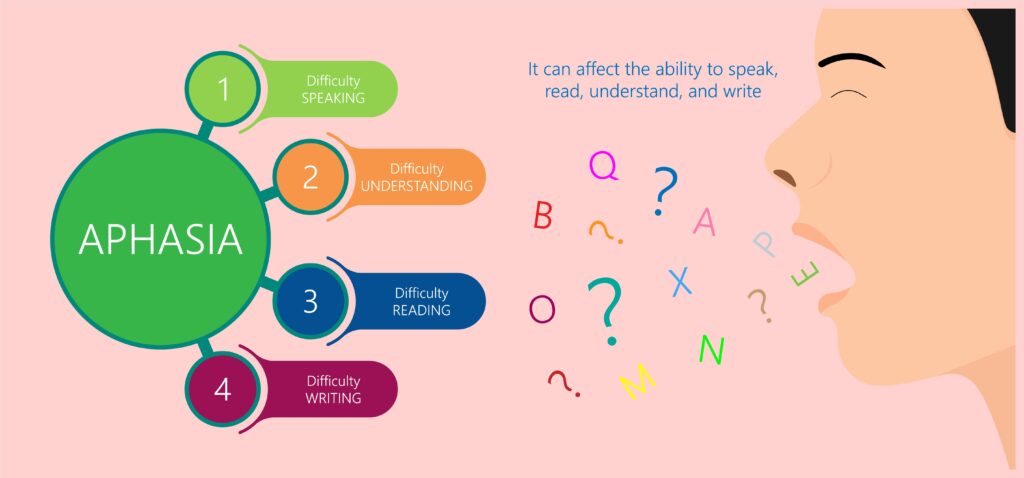An estimated 180,000 new cases of aphasia are diagnosed in the United States each year, with approximately 1 million people suffering from the condition today. The effects of aphasia are difficult to predict and usually depend on the severity of the language impairment and the level of brain damage. Aphasia can be so severe as to make communication with the patient almost impossible or so mild that is it barely noticeable.
Our aphasia treatment is provided by a team of highly skilled physicians, therapists and neuropsychologists working closely to achieve the best recovery possible for you and your needs.
What is Aphasia?
Most often caused by stroke, aphasia is a communication disability that occurs when the language centers of the brain are damaged. Aphasia may also be the result of brain surgery, brain infections, traumatic brain injuries or other neurological diseases, including dementia.
Aphasia is a language impairment that makes it hard to understand or produce the spoken or written word. Unlike other speech disorders, aphasia is an acquired, not congenital, disorder that exists as a result of a stroke, brain injury, brain infection, or other neurological diseases, including dementia and Alzheimer’s. There is a form of aphasia, Primary Progressive Aphasia, that is not caused by an acute brain injury, but rather is a neurodegenerative disease of insidious onset. This disease presents with progressive isolated loss of language function, without significant impairment in other cognitive domains.
Aphasia Symptoms
Aphasia is a hidden disability, with no obvious outward signs, but someone with aphasia may do one or more of the following:
- Speak in short or incomplete sentences
- Speak in a way that does not make sense
- Substitute one word for another or one sound for another
- Speak words that no one else recognizes
- Not understand other people’s conversation
- Write sentences that others do not understand
In addition to difficulties with listening, reading, speaking and/or writing, aphasia can cause other problems. Someone with aphasia also may have trouble thinking and remembering things, managing time, paying attention and remembering details. Even though aphasia makes it harder to understand and produce language, it does not impact intelligence.

Types of Aphasia
There are two broad types of aphasia – receptive and expressive. Individuals with receptive aphasia typically have difficulty with receiving or understanding language, while individuals with expressive aphasia typically have difficulty producing language. There are some individuals who show signs of both expressive and receptive aphasia at the same time.
The most common type of receptive aphasia is Wernicke’s aphasia. People with Wernicke’s aphasia have a normal pattern and rate of speech, but the content of their speech is meaningless. They may say something like, “Ambition is very very and determined.” Someone with Wernicke’s aphasia can produce speech, but their speech generally includes reduced amounts of information. Individuals with Wernicke’s aphasia become frustrated because they do not comprehend why they cannot understand others and why others cannot understand them.
The most common type of receptive aphasia is Broca’s aphasia. While a person with Wernicke’s aphasia has difficulty understanding language, a person with Broca’s aphasia will primarily have trouble producing language. Someone with Broca’s aphasia will often present with slow, choppy speech that consists primarily of nouns and often convey more information than the “empty” speech of someone with Wernicke’s. A sentence like, “Book book table two.” is typical for someone with Broca’s.
Aphasia Treatment
Speech language therapy is a crucial part of the recovery process. At Good Shepherd Rehabilitation Network, speech language pathologists work with patients and their families to find techniques that maximize communication for successful participation at home, work and in the community. Therapy may include working on language skills, using computer-based programs, using low- and high-tech communication devices as well as conversation training and modeling. Communication partner training and education is the most important component to maintain communication participation for those suffering from aphasia, as well as to sustain their ongoing desired relationships.
Once Good Shepherd patients have completed their individual rehabilitation program in speech therapy, they can participate in a weekly communication skills group to transition from the direct skill training of the clinical setting, to the carryover of learned functional communication skills in the community. This happens while receiving the support of others going through similar communication trials. The group is led by a speech language pathologist who promotes ongoing education and participation
Request an Appointment
To request an appointment at a location near you, call us at 1.888.44.REHAB (73422) or fill out the form below.


